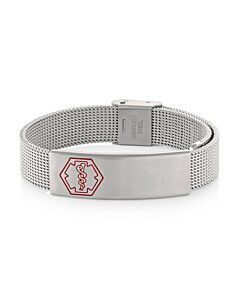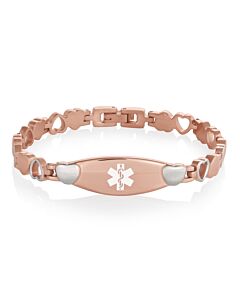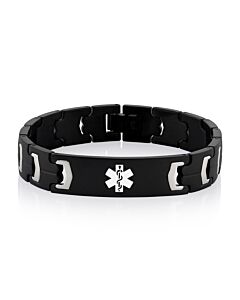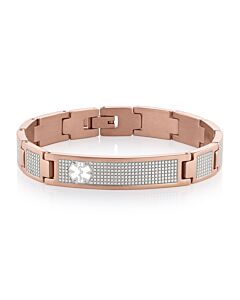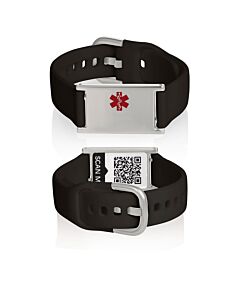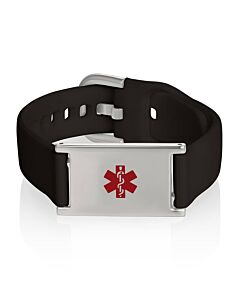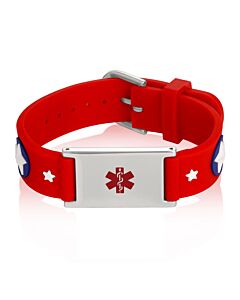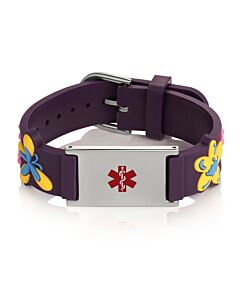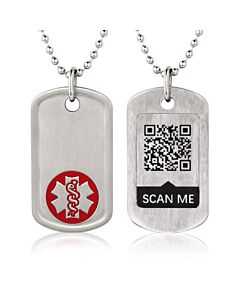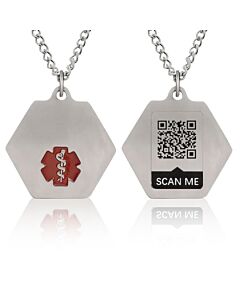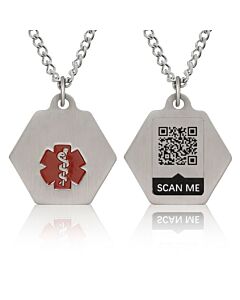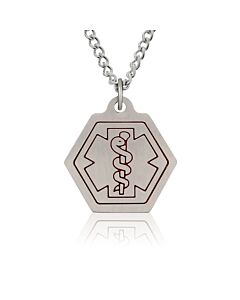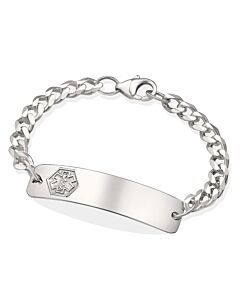

Medical IDs for Shellfish Allergy
A shellfish medical ID is strongly recommended for individuals living with a fish and/or shellfish allergy. Shellfish allergies are the most common adult-onset food allergies, affecting more than 6.5 million adults in the US alone. Symptoms of shellfish allergies include life-threatening anaphylaxis which requires immediate medical attention.
During anaphylaxis, a person’s throat will begin to swell, making it very difficult to breathe. This can lead to a severe drop in blood pressure and ultimately cause a person to go into shock. A medical ID can alert others of a shellfish allergy, and in the event of an allergic reaction, help them to quickly identify a shellfish allergy as the cause of these symptoms.
"Let people know (of shellfish allergy)...You should always carry your epinephrine pen and make sure it hasn’t expired. You or your child should wear a medical bracelet or necklace containing your allergy information." - Healthline
List of Shellfish to Avoid
Cleveland Clinic recommends avoiding these ingredients and food if you have shellfish allergy.
|
|
Having an allergy to one or multiple types of shellfish merits wearing a medical ID.
Severe symptoms of Shellfish Allergy
A medical ID can clearly identify these symptoms as allergic reactions to shellfish. Without some form of medical alert, symptoms can be misdiagnosed and cause significant delays in receiving emergency treatment.
|
|
Medical IDs and Shellfish Allergy in Emergencies
Allergic reactions to shellfish occur soon after consumption, typically within a few minutes to a few hours. Symptoms can affect different parts of the body and range from mild to life-threatening reactions that require emergency attention.
Epinephrine is the first-line treatment for severe allergic reactions to shellfish, including anaphylaxis. However, symptoms like swelling of the throat can make it difficult to communicate health information in case of an emergency. This is why a medical ID is important. It can effectively alert others of a shellfish allergy and prompt responders to give an epinephrine injection immediately.
A study shows that food-induced anaphylaxis causes approximately 30,000 emergency room visits and about 150 to 200 deaths each year in the U.S. alone.
What to Engrave on a Shellfish Allergy Medical ID


Wearing a medical ID bracelet can save a life if it has the proper information on it. Here are the most important details to engrave if you have shellfish allergy:
- Name
- Shellfish allergy – allergy can be abbreviated to ALGY on your medical ID. Example: ALGY: SHELLFISH or ALGYS: FISH, SHELLFISH
- Other allergies and medical conditions that may or may not be related to shellfish allergy i.e. asthma, diabetes, or autism.
- Epi-Pen information – alert others that epinephrine injection is needed in an emergency and where it can be found. This can be engraved as: give epipen, give epi, epi in bag or epi in purse for example.
- Emergency Contact – especially if a child is wearing the medical ID, list parent’s emergency numbers or a prompt to call 911 immediately.
Our Adult Shellfish Allergy Bracelet & Wristband Options
When choosing a shellfish/fish allergy bracelet, you’ll need to decide between the various metal types and styles offered by Universal Medical ID.
Fish and Shellfish Allergy Bracelets for Kids
Shop kids shellfish allergy bracelets for all ages, from toddler up to young adult.
Our Shellfish Allergy Necklace Options
When shopping for a shellfish allergy necklace, select the right style. We offer medical ID necklaces in different styles, from dog tag to more elegant gold designs.
Featured/Best-Selling Shellfish Allergy Jewellery
View several of our best seller shellfish allergy jewellery options.
Frequently Asked Questions
Should I wear a medical alert bracelet for shellfish allergy?
Yes, you should wear a medical alert bracelet for shellfish or fish allergy. Talk to your medical provider about the best option and then order the appropriate medical ID from Universal Medical ID.
What is the medical alert symbol for shellfish allergy?
There is no symbol for a shellfish or fish allergy, it is best to engrave “Shellfish Allergy” or “FISH ALGY” on your medical ID to ensure it is understood by emergency medical personnel. Include any additional emergency rescue information, such as epipen location.
Should I still carry a shellfish allergy card if I wear an shellfish allergy alert bracelet?
Yes, carrying an expandable wallet card is a great way to make sure all your medical information is easily referenceable. Make sure to engrave the critical, life-saving medical information on your ID and provide additional details, such as emergency contact information, within your shellfish allergy card.
"If you have a shellfish allergy, talk with your doctor about carrying emergency epinephrine. Consider wearing a medical alert bracelet or necklace that lets others know you have a food allergy." - Mayo Clinic



 - US
- US  - Canada
- Canada  - Australia
- Australia 
